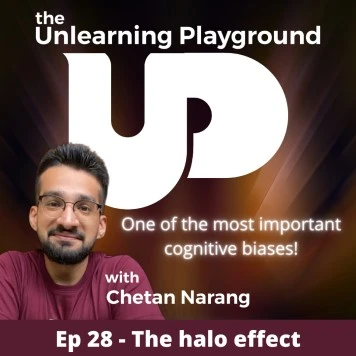To look clearly is to look without an image, without any symbol or any word.
JIDDU KRISHNAMURTI
The halo effect, without a shadow of doubt, is one of the most important cognitive biases every adult in the room must be aware of.
It is extremely important because it directly influences the way you think about people and in doing so, has a direct impact on the way you navigate your interpersonal relationships – both personal as well as professional.
Join me in this episode as I walk through how this bias affects our everyday thinking and also discuss 3 key ways to avoid falling prey to it.
Let’s have some fun in the playground.
Until next time.
Peace out.

<OUTLINE>
| 00:00 | Intro |
| 00:30 | What is the halo effect? |
| 02:05 | Stories |
| 03:15 | Advice #1 |
| 04:34 | Advice #2 |
| 05:36 | Advice #3 |
| 06:22 | Why all of this is especially relevant today |
Check it out on your platform of choice.
Or listen on the custom player below
We humans are designed, in part of course, to be able to think quickly whenever a situation demands. But like a lot of mechanisms of our own thinking, this can come back to bite us in the most unexpected of ways.
How the halo effect works, is a not-so-comfortable example of this latter kind.
It particularly comes into question when we are dealing with people. Because the halo effect, in essence, is an extension of how we form stories in our minds about the different people in our lives. These could be people you’re in a direct relationship with – personal, professional or otherwise. These could also be people you know from a distance – a public figure, a celebrity, a politician, etc.
As most of us already know, uncomfortably so, it’s not uncommon to have very strong feelings/opinions about things we hardly know anything about. The extent to which we are able to believe in and then subsequently act on these opinions is dependent on a whole bunch of factors, but primarily on how coherent is the story in our mind about the particular situation in question.
And this is especially relevant to the opinions we form about people, and that is precisely where the halo effect kicks in.
Even if we do not realise it consciously at times, most of our lives are about relationships – personal, professional, casual, distant, close and maybe a host of others. And cognitive biases such as the halo effect encompass our decisions, our thoughts, our judgements and our actions across all of these relationships.
Which is precisely why I find them particularly important for everyone to understand and wrap their heads around, especially anyone wanting to be one of the adults in the room – which is most of us at some point in our lives.
If this kind of learning, or unlearning, resonates with you, you can check out our playlist on cognitive biases and logical fallacies from the link down below. I have dedicated a section of my podcast purely to enable my listeners to be better aware of these subtle yet important phenomena of the inner workings of our minds.
If you’ve reached this part of this page, I’d like to invite you to dive into the episode on the halo effect here.
All the other episodes are available on this website itself, organised into playlists by the core topics they’re aiming to address – spirituality, cognitive biases, money, everyday-life advice, etc.
If this calls out to you, dive into the podcast from the link down below.
As always, I’ll see you in the playground.
Let’s have a good game!
Until next time.
Peace out.




